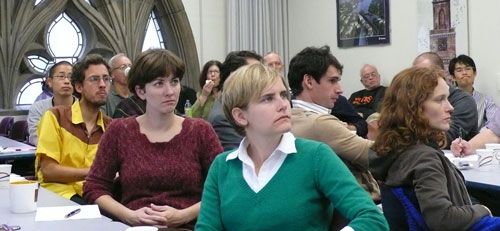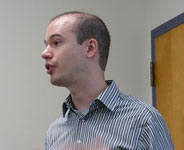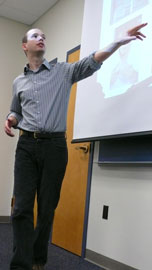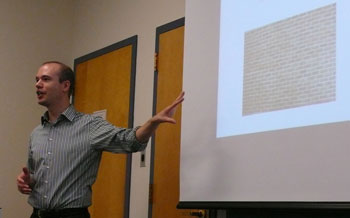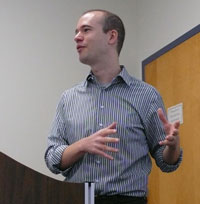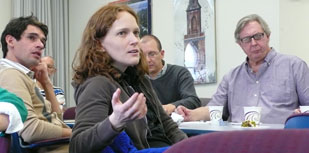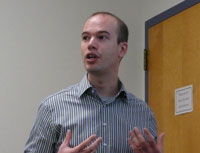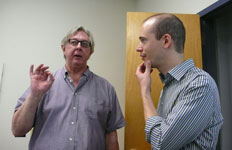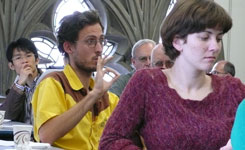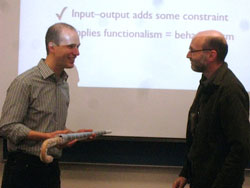::: center home >> being here >> last donut? >> limits of physics |
Does a Rock Perform Every Computation? One of the more delightful parts of philosophy of science is that we can be playful in our titles. Mark Sprevak's title for today's talk is a fine example. Everyone glances at the question of the title and the answer is obvious. While introducing another speaker the previous week, I had quipped that this talk might just be very short. But then this is philosophy. So you know that, quite soon into the talk, you will start to change your mind. Maybe, you will be saying to yourself, there is a sense in which a rock does perform every computation. And then, in an enthralling moment of enlightenment, you will conclude that it is the right sense. This mental inversion was to be anticipated with relish. Moments before Mark was to speak, I was standing talking with him. Mark began by reminding us why philosophers have found their interest in the notion of computation to extend beyond our laptops and desktops. Thinking, many philosophers now say, just is a brain computing. That means that brains are computers; and for that to be so, it is essential that a brain, made of wet neurons, can do just what is done by an ordinary computer, made of wire and silicon. What is it to compute according to the standard position? It is, Mark assures us, just that the system has patterns of activation of the right structure. Those patterns can be realized in any material, wet, dry or otherwise. Therefore both brains and laptops can compute. That sounds quite right, of course. However I had already been exposed to this literature, so I knew that we were at the start of a slippery slide downward. First came John Searle's argument. Here was a computer, according to this definition. An image of a brick wall appeared on the screen. This was the moment that the sale would be made, that we would be convinced that this piece of Florida swampland was the real estate bargain of the century. A wall, Mark now explained, has an enormously complicated inner structure, all the way down to a myriad of atoms and their many interactions. In amongst all this is quite likely to be a pattern of activation that matches the activations in an ordinary computer running Microsoft Word. That seemed plausible. That it is likely so, was established by a simple argument of Hilary Putnam's. As some object traces out its history in phase space, we can interpret it as a computer moving through states A, B, A, B, ... We merely label the appropriate sections of its phase space trajectory with the tags A, B, A, B, ... The downward slide is now complete. The object could be a rock falling into a well. On the way down, it is computing as surely as the fanciest computer at NASA computing the trajectory of the space shuttle. This moment is what makes philosophy so intriguing. You now believe something so absurd that you would never to admit it in polite company. You'd instantly develop a fascination in accountancy and double-entry book-keeping in order to steer the conversation elsewhere. I am ready to believe that a falling rock computes. But I am not ready to say that is all there is to it. I was grasping about for the straw. What we are overlooking, I was saying to myself, is that the rock by itself is not enough. We also need some kind of interpretative apparatus that maps pieces of the rock's phase space trajectory onto the computational behaviors of a more normally structured computer. That map would need to be as richly structured as a computer. The richness of that map would distinguish the good and bad cases of computers. Or so I guessed. Would this thought be in the list of seven responses Mark now promised to review? It was not. As he worked through the list, each seemed quite convincing until he came the point where he explained why they didn't work. Then finally, Mark came to the last two. These, he felt, were the most promising.
Then came Mark's own "representational response." A computer implements patterns among representations, things created by us. So, Mark continued, if aliens were willing to do the work and figure out the representations within a brick wall, it could be their computer. That explains, I now saw, why the invasion of the aliens, so assured in the wake of the 1947 flying saucer scare, had taken so long to materialize. Like the rest of us, they are stalled by computer problems. Mark's talk was now over. It was very clear the discussion would be energetic. Before I could officially declare a break to pick up coffee and the last donut, two people had put themselves in the queue. Peter Machamer, himself always eager to head the queue, complained that this was unfair. The questions seemed to go down the list of responses. Each had exerted charms somewhere in the room. It was a sure indication that this was not an issue with a simple solution. John D. Norton |


